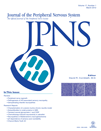Single-nucleotide polymorphism of transient axonal glycoprotein-1 and its correlation with clinical features and prognosis in chronic inflammatory demyelinating polyneuropathy
Abstract
The single-nucleotide polymorphism (SNP) rs2275697 in the transient axonal glycoprotein-1 (TAG-1) gene was reported to be associated with responsiveness to intravenous immunoglobulin (IVIG) treatment in patients with chronic inflammatory demyelinating polyneuropathy (CIDP). However, it is not known if this SNP is associated with long-term prognosis. We examined the case records of 32 Chinese CIDP patients. The overall response rate to IVIG, prednisolone, or plasmapheresis was 83%. After 5.4 years, 57% of patients were on maintenance immunotherapy. Patients with higher modified Rankin score and more prolonged distal motor latencies in the upper limbs on presentation had a higher risk (odds ratio [OR] 3.86, 95% confidence interval [CI] 1.23–12.11 and OR 1.04, 95% CI 1.01–1.07, respectively) of being on maintenance immunotherapy. Blood samples from 24 patients and 147 controls were examined for their genotypes of four non-synonymous SNPs (rs41264871, rs36074532, rs5611135, and rs2275697) in the coding region of TAG-1. The G allelic frequency of rs2275697 was similar between CIDP patients and controls (56% and 50%, respectively) and was not associated with treatment responsiveness, treatment dependence, disability, or mortality.




